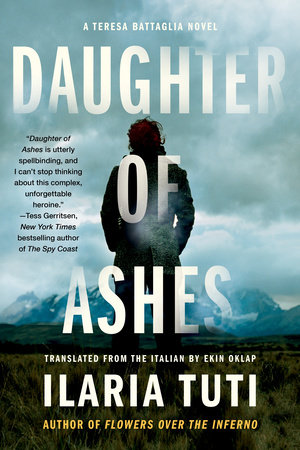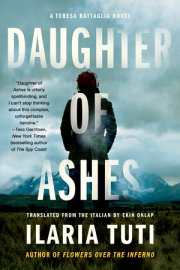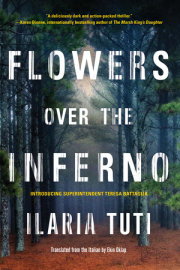Prologue Twenty-seven years ago At the end of everything She wasn’t much older than thirty and she felt like she had turned to dust. What could she make out of dust? A second life, but she would have to knead it with blood and tears, and the sweat of a creature clinging to the edge of an abyss.
When she lay down on the bed for another round of the treatment that was supposed to relieve her pain and rebuild what had shattered inside of her, Teresa had initially dreaded the feel of a stranger’s hands on her body, but realized she found it soothing. The doctor’s practiced touch took her back to her childhood, to the cradle, as if her whimpers might be the cries of an infant.
“We die and we are reborn many times over the course of a single existence, Teresa. This has already happened. It will happen again, and it will hurt, but look at who you’ve
become.”
Teresa shifted her gaze from the ceiling to the woman’s face. She felt like an empty vessel, incapable of welcoming anything at all.
The doctor leaned over the bed where that arid emptiness lay.
Every word that came out of the doctor’s mouth was molded by the inflections of her mother tongue, nestled in the space between her palate and her teeth, and curled across the back of the f.ng huang phoenix embroidered on her robe of red silk. Red like the fruit of the strawberry tree whose color blazed through misty winters in Teresa’s grandparents’ garden.
“Everyone is talking about what you managed to do.”
It was disturbingly easy to wind your memories back, when all seemed lost. The end was a tilted plane where everything slipped back to the point of origin. Teresa was falling slowly into a black hole.
The ritual incense sticks released plumes of twisting smoke. In the background, bamboo flutes mimicked whispering winds from faraway lands.
The doctor inserted a second needle into Teresa’s skin.
“This energy point is called
Da Ling, meaning ‘great hill.’ It represents burial mounds . . .”
Teresa closed her eyes, her body a living grave.
“But every tomb carries a secret; that is why
Da Ling is known by other names, too. To reveal, and to restore.” Another needle into the skin. “
Gui Xin, ghost of the heart.
Zhu Xin, governor of the heart. It is the past and your guilt that you must bury, Teresa, not your talent.”
Teresa parted her lips. Even talking was painful. Her jaw, pierced with screws from her operation, was still in a brace.
“I’m d-d-dust,” she managed.
Anyone could have blown on her and swept her away. A man she had once loved had flung her bones across a black altar. Teresa could feel them now spinning, swirling in the breath of life, as if reassembling the skeleton upon which a new beginning might rest. They crackled with the sound of the fears that woke her in the middle of the night. The snap of breaking bones.
Her bones.
The panic attacks always ambushed her after dark, in the silence, her arms and legs tangled in the sheets, an offering to ruin. They rode on a herd of black horses galloping across the slopes of her ravaged flesh. The horses would pummel their way across her stitches, their hooves digging into her knees and the inner curve of her elbows, pounding against her collarbones and her ankles. They pulverized what Teresa could barely keep together, breaking the woman she had become, a woman reduced to bare bones, her skin flayed off. They reduced her to tiny fragments, and a little piece of her was lost every time.
Behind her, Mei Gao put her acupuncture equipment away. Then she held her patient’s face in her hands and gave it a gentle pull until Teresa’s chin lifted.
Teresa felt her body opening up to the pain and to a deeper breathing, handing itself over to a force that came with a price—to be paid in the currency of hurt.
“You were dust, but your suffering has turned into fire,” the woman whispered. “You are incandescent. And from the ashes of your previous life, you are reborn. Such is the fate of commanders, Superintendent Battaglia. Don’t ever bow your head again, not to anything or anyone. Not even to yourself.”
1 Today The taxi stopped outside the gates of the maximum security prison.
The woman made no move to open the door. Her expression seemed to suggest that freedom lay on the other side, just past the watchtowers and the ramparts made of reinforced concrete.
The driver turned around, resting his elbow on the passenger seat.
“Is this the right address?”
It was, and her destination was right there: “beyond,” where any certainty would disappear.
“Ma’am?”
The woman hesitated, wary of taking another step forward in this life she should have bid farewell long ago, and feeling self-conscious about the person she no longer was—though everyone else insisted on treating her as such. Bit by bit, that mirror image was peeling off her body, consigning the woman she had once been to the past. She was nearly sixty years old; her body creaked as if she were eighty, and her soul ached as if she’d lived for a century. She felt like a ghost in a world that was no longer her own.
“Ma’am, is this where you wanted to go?”
Ghosts have no voice. From the pavement outside, someone replied in her stead.
“Yes, it is.”
Massimo Marini opened the door. The heavy afternoon light of spring shone behind him, illuminating the quiver of a muscle down the side of his jaw. Inspector Marini was nervous, as nervous, perhaps, as the woman before him, who recognized in that twitch of his jaw the signs of barely contained emotion. They hadn’t seen each other in two weeks, not since the day they had both nearly died.
The inspector took his wallet out from the inside pocket of his jacket, paid for the ride, and put his arm out to help the passenger out of the car.
“Shall we go, Superintendent?”
Teresa Battaglia tightened her grip on her walking stick, deliberately holding it aloft between them.
Is this how you want me? she was silently asking him, the savage irony in her gesture aimed really at herself. Her disabilities, both the visible one and the one that was still hidden, were an uncomfortable presence they both needed to come to terms with.
Marini leaned a little closer.
“Shall I just pick you up? I could, you know.”
“You’d break your back.”
Marini grabbed her stick.
“You’ll have to whack me with this thing before I let you change your mind.”
She tugged at the stick but couldn’t wrest it back.
“I might just do that.”
“Come on, get out of the car.”
“I’m only getting out because I have chosen to do so.”
The driver started the engine.
“Lady, please just get out.”
Teresa took Marini’s arm. It wasn’t only her muscles that ached, but her pride, too, pilloried by her own body’s clumsy slowness. Fragile and exposed, Teresa felt like she had surrendered her weapons, but somehow, this had not brought her the anguish she had expected. On the contrary, the weight on her shoulders seemed to have eased. Feather by feather, she had relieved herself of the wings she’d so often had to patch together to overcome her latest obstacle, and had donned instead the delicate robe of courage.
Now that they were finally face to face again, they took a moment to study each other. It had scarcely been twenty days since they’d closed the case of the
Sleeping Nymph, and they both still bore its scars: a bout of sciatica for her, a few burns and bruises for Inspector Marini. But how his eyes blazed. Teresa saw in him the young officer she had once been, sleep-deprived and desperately eager to prove herself. He was already primed to dive into a fresh case, and he wanted Teresa to go with him—unaware that she had already fallen into this particular vortex before, nearly thirty years ago.
“How are you?”
Teresa was afraid. She felt cornered, uneasy, a laughing stock, yet still alive in spite of it all. But life was so exhausting.
“I’m tired.”
Marini smiled, and all of a sudden, he looked like a little boy. All the shadows gone, every need swept away by the sheer joy of the moment.
“I know. Thanks for being here.”
Teresa watched as a poplar seed came to rest on the inspector’s shoulder, a ball of fluff that caught the light.
“And how are you?” she asked, without meeting his eyes.
“I’ve missed you.”
She wondered whether the tiny seed could feel the warmth of the sun through the fine white hairs that surrounded it—and if in that ligneous darkness where nothing seemed to move, life might already be planning a million different ways to be reborn, each path older than humanity itself. That same warmth had just touched her, too.
“Did you hear what I said?”
Teresa forced herself to ignore the tenderness in his words.
“Careful, Marini. Someone might get the wrong idea.”
He burst out laughing.
“That would be an interesting diversion for Lona to deal with.”
At this mention of the district attorney, Teresa became serious again. She took a few labored steps forward. The painkillers and anti-inflammatories weren’t helping much.
“How are Elena and your daughter doing?”
“They’re well, thank you. Elena always asks after you, and our
son grows with every ultrasound.”
“It’s going to be a girl.”
“That’s not the feeling I’m getting. There must be something to be said for paternal instinct.”
“I wouldn’t be so sure about yours, Marini . . .”
“Oh, drop it.”
“Welcome back, boss.”
Teresa looked up.
Officers de Carli and Parisi were standing by the watchman’s cabin, smiling at her. In their jeans and polo shirts, they looked like puppies—not the ruthless hunters she had trained. Like Inspector Marini, they were around half her age, and would forever be her “boys.”
Teresa was accustomed to gauging other people’s reactions as part of her work, studying their body language for the words they refused to let themselves speak, and for the lies they withheld. But she was not used to doing the same solely for her own benefit. She felt a little unmoored now, eyes roaming from one face to the next in search of the truth.
All she found there was affection. She was forced to lower her gaze, feigning an unusual interest in the unevenness of the asphalt beneath her feet.
“I don’t know why I’m here,” she muttered. Her discomfort caused the walking stick to slip out of her hand. Marini bent down to retrieve it, then took one of her hands and placed it in the crook of his arm.
“You’re here to take back the place that’s yours by right, aren’t you?”
Limping forward, and with her back hunched, Teresa swallowed a joke she would previously not have hesitated to make. But she did not want to seem too bitter. Or was it far too late for that?
“I’m not taking back anything,” she murmured. “I won’t have you spreading these rumors; Lona might have a stroke.”
De Carli cleared his throat, failing to stifle an involuntary chuckle.
“Actually, the district attorney is waiting for you, Superintendent.”
Parisi looked at his watch.
“Has been for an hour, in fact, though he seems to be keeping his cool for now.”
Teresa felt her back straighten. She glared at each of them in turn.
“Have I not made myself clear to you all?”
Marini gestured at the guard on duty to open the prison gates.
“Crystal clear, Superintendent, and it’s clear to the district attorney, too. Specifically the fact that a convicted serial killer has requested to speak to you and you alone. There was nothing else Lona could do but take note.”
The cage doors opened with a clanging of locks and a flurry of sliding gates, the echoes reaching where the eye couldn’t see. Like a machine designed to devour tormented souls, it quickly swallowed them whole.
Copyright © 2023 by Ilaria Tuti; translated by Ekin Oklap. All rights reserved. No part of this excerpt may be reproduced or reprinted without permission in writing from the publisher.






